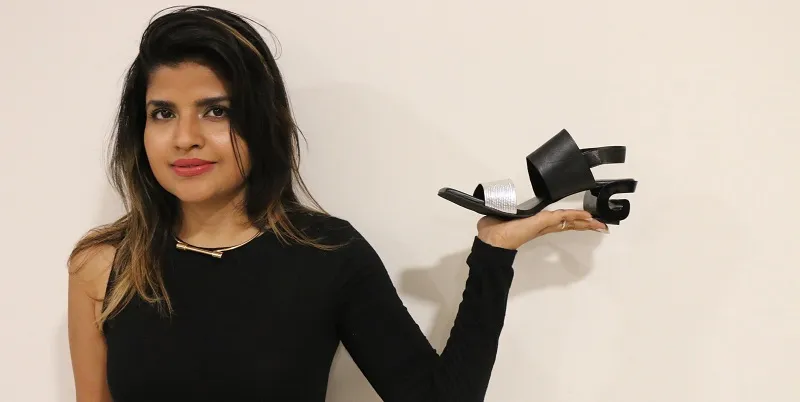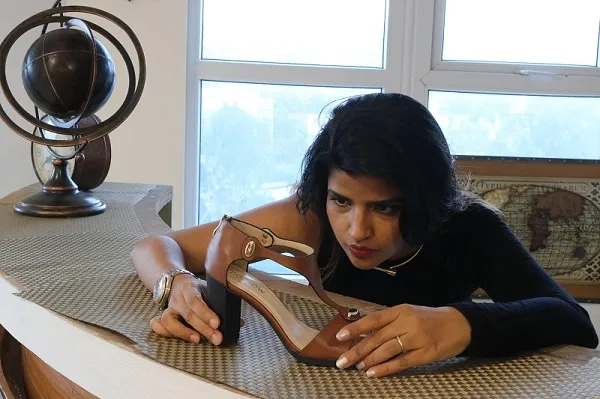Starting with Rs 2 Cr, Monrow rakes in Rs 6 Cr in just one year
Monrow aims to make heels more comfortable, bridging the gap between design and comfort
Startup: Monrow
Sector: Retail
Founder: Veena Ashiya
Year of launch: 2016
Where is it based: Bengaluru
Funding: Rs 2 crore
Veena Ashiya calls herself a ‘shoeholic’. An alumnus of NIFT Bangalore, she discovered the entrepreneur in her because of her love for shoes.
Her story began in New York, where she was working with Versace. In the city, Veena would walk everywhere – to work, to meetings, and to dates. She would make a habit of carrying a pair of comfortable shoes to make walking easier.
“I have always had a love-hate relationship with heels - loved the design, hated the discomfort. So, the concept of shoes that look and feel fantastic, and are also affordable has always been on my mind,” says the 33-year-old.

When she moved back to India in 2011, Veena initially focused on expanding her family business – Moksh Perfumery Products – outside India.
Hailing from a Marwari family, business has been part of Veena’s DNA. “Before I learnt ABC in school, I was taught about ROI at home,” she says.
In India, Veena found Indian women struggled to find good shoes. “I couldn’t hold myself back anymore, this was my calling. I was determined to make my eternal love for shoes into more sustainable and functional piece,” says Veena.
With Rs 2 crore in seed funding from angel investors, Veena launched Monrow in September 2016 in Bengaluru in association with Future Group as the retail partner. Monrow aims to make heels more comfortable, bridging the gap between design and comfort. They started selling online in December 2016.
Bringing up Monrow
At Monrow, Veena focuses on product design, building a team, and efficiently deploying capital. A team of 25, Monrow hones its employees as entrepreneurs. Veena says Monrow is like a mini “Entrepreneur in Residence” programme for every team member, with many aspiring to build something of their own in future.
Although Bengaluru offered a great talent pool, the IT city is not a manufacturing hub. Veena, however, adds that the city is a retail hub, so understanding consumer behavior is relatively easier.

Monrow targets independent, fashion-conscious women who looking to get more done through their day. Hence, fashion shoe brands like Steve Madden and comfort shoe brands like Clarks are competition.
Monrow’s average pricing is Rs 1500 to Rs 2000 for a pair of shoes. “We have consciously tried to stay away from the discounting game. We only give discounts at the end of the season, primarily to support our retailers. Once there is great product market fit, discounts become secondary,” Veena says, adding that the team’s understanding of the Indian consumer, and designs specific to suit the anatomy of Indian feet makes a big difference.
Also, Monrow is now working on creating virtual trial rooms for shoes to make it easier for consumers to buy online. Veena explains, “Comparing a 3D scan of your feet with that of the shoes shows you how well a style will fit you. The system will have in-built AI (artificial intelligence), and will start recommending styles based on your feet anatomy.”
Organic growth
Partnering with behemoths like Future Group, Reliance Industries and Myntra, and with specialised shoe retailers like Centro, Monrow has sold more than 20,000 pairs of shoes within 15 months of its launch. According to Veena, incorporating consumer feedback fast, and getting the right products for distribution, has contributed to Monrow’s growth.
The company retails across 14 locations in Mumbai, Delhi, Bengaluru, and Hyderabad through partnerships. Its online partners include Myntra, Jabong, Flipkart, and Amazon. Monrow sells about 100 pairs of shoes a day, with 70 percent sales from offline stores.
Veena believes online and offline customers have become fluid. “We look at both in a symbiotic way. Online is a very width-driven game, whereas offline is primarily by strategic location of stores. Online, search results will get your products noticed; offline, locations and retail partnerships get your products noticed,” she explains.
Monrow has Rs 6 crore ($1 million) annual run rate. Veena says has double-digit margins on a unit economics basis.
Role of the larger ecosystem
Monrow partners with third party logistics players for delivery. “We closely watch the performance of our logistics partners on lead times, experience with the delivery person, and condition of the package upon delivery,” says Veena.
It also works closely with manufacturers for better turnaround times, and quality and designs right for its orders.
“We are always focused on reducing the time from factory to shelf so that fresh designs reach consumers like a hot piece of cupcake. We have a lead time of three weeks, which is amazing, as India can be a very challenging place to build such efficiency,” Veena claims.

On the marketing side, the company’s focus is on fashion bloggers. Veena elaborates, “We believe fashion bloggers are mini celebrities as they are far more relatable to the common woman. We can proudly say we are one of the favourite fashion brands among India’s fashion blogger community. Whether it is Nilu Thapa loving our silver patent mules, or Sherry Shroff musing on cherry red block heels, they all have wonderful things to say about Monrow. We have had close to 50 fashion bloggers expressing their Monrow love.”
Long term plans
In 2018, Monrow is looking to raise Rs 6 crore in VC funding. In 2019, it plans to open an experience centre to focus on brand building and customer engagement, rather than sales.
From its current gross merchandise value of Rs 6 crore, Monrow aims to hit Rs100 crore in the next four to six years by reaching out to customers through 100 offline stores - across all metro cities
and and Tier II cities, as well as 2,000 pincodes through online partners. Veena claims the company has seen 25 percent monthly growth in sales across online platforms. In December 2017, it sold 3,000 pairs. It is not easy to crack visibility in both offline and online channels, but Monrow’s shoes are meant to be tools for free movement. If they allow for an easy path, literally and figuratively, for more customers, Monrow’s dreams are a reality in waiting.








